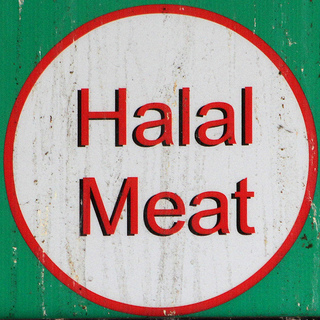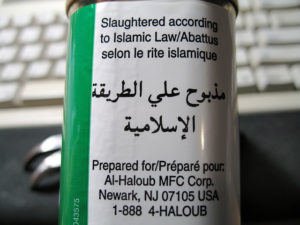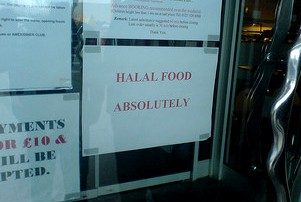
By Hasan Azad
Do Muslims belong in the West? This is the real question behind the recent halal hysteria in Britain. This is also the question behind previous—and, no doubt, future—questions about the headscarf (hijab), about the face veil (niqab), about Muslim men, about Muslim women, about Muslims and homosexuality (which is prohibited according to Islamic law), and about Muslims and violence.
But staying with the issue of Muslims and animals—or, more specifically, how Muslims slaughter animals—the argument being made by a portion of the British media is that the halal method of slaughter (by slitting the animal’s throat while reciting an Islamic formula) is inherently inhumane, while the secular method (which involves first ‘stunning’ the animal using a bolt gun) is inherently humane. So far only Giles Fraser has pointed out that animals raised in factory farms, which supply both secular slaughterhouses as well as Islamic ones, are reared in remarkably cruel conditions. Therefore, the distinction over how the animals are killed is a relatively small, if not, indeed, hypocritical one.
I wonder whether this debate regarding the “humaneness” of secular methods of killing animals versus the “inhumaneness” of the Islamic form of slaughter draws on an essential liberal secular trope? The trope being: secularism is fundamentally humane and moral, while its Other—Islam and its practitioners—are inhumane and immoral. I ask this question because there is an increasingly loud group of voices in the West that sees Islam and Muslims as fundamentally religious and therefore the polar opposite of all that is “secular,” where the secular represents all that is modern, rational, progressive, and Western. This same group of voices, which has been gaining in energy over the past decade or so, wants to see Islam itself erased from Europe.

Erasure can be seen occurring both “externally” and “internally.” Externally, perhaps the most obvious example of erasure is the banning of the hijab from schools and the niqab from public spaces in France (debates surrounding the niqab and the hijab are also occurring in the United Kingdom, as well as much of continental Europe). The internal forms of erasure are less immediately obvious. Since the banning of the hijab from schools in France, there has been a concerted effort on the part of school teachers to insist that Muslim school girls wear shorter, more revealing skirts, while mothers who wear the hijab have been discouraged from participating in school events in the case of younger children, the claim being that their presence encroaches upon laïcité. Most recently, French Front National (FN) leader, Marine Le Pen, has announced that school cafeterias will no longer serve non-pork substitution meals to children living in towns won by FN candidates, the argument being made that it is to ensure that laïcité is protected. In Britain, there are increasing efforts at British universities to limit Muslim students from praying the communal Friday prayer with claims of upholding secularism as well as the need to curtail, and ultimately defeat, extremism being made—and the two claims are linked of course. Now there is the question of halal meat.
But I would like to take the discussion beyond the merely academic concern with the tension between “secularity” and “Islam” and back to the very real concern with animal welfare. It is my understanding, based on considerable study and deliberation, that the issue of animal welfare is central to the Islamic ethical perspective. Animal cruelty is unacceptable according to Islamic principles. The Prophet of Islam was never cruel towards animals and he categorically forbade all forms of animal cruelty. And factory farming is fundamentally cruel according to Islamic ethical principles.

Therefore, the way in which some Muslim (and non-Muslim) commentators are framing the discussion in Britain—as their “right” to eat halal meat—entirely misses the point of what really constitutes halal meat in the first place. Muslims seem to have forgotten that not only are there strict Islamic guidelines as to how animals are to be slaughtered, but also, significantly, about how they are to be raised. Animals cannot be kept in cages. They cannot be distressed. They cannot be tortured or be maimed or snatched from their mothers during their infancy. All of which are done constantly to factory-farmed animals. And the overwhelming majority of meat—whether “halal” or “secular”—comes from factory farms.
The idea “you are what you eat” was recognized as fundamentally true for the early community of Muslims led by the Prophet Muhammad, as well as for Muslims following through the centuries. It is only a recent phenomenon, not more than a few decades old, that Muslims have been unthinkingly co-opted into the logic of mechanized production of all things, and not just meat, which is a logic that knows no race, religion, or gender.
Muslims need to take this latest question—and “crisis”—regarding their belonging in Britain and see it for the opportunity that it is. It is an opportunity to reconnect with the highest principles of the Islamic tradition and to help create greater awareness of a more holistic way of living that is beyond the hype and hysteria of the latest media campaign. It is an opportunity to be more deeply ethical and not simply unthinking consumers. It is an opportunity to relate to one another as human beings and towards animals as guardians and protectors and not simply opportunistic exploiters and pillagers—which is the case for the vast majority of people living in the West today.
Hasan Azad is a PhD candidate in the Department of Religion at Columbia University with a focus on Islamic studies. His dissertation is an interdisciplinary examination of the role of Islamic ethics in constituting diasporic communities in the West. His research interests include postcolonial religious identities, secularism and secularity, Islamic politics, political theory, Islamophobia studies, sharia, and Sufism.
